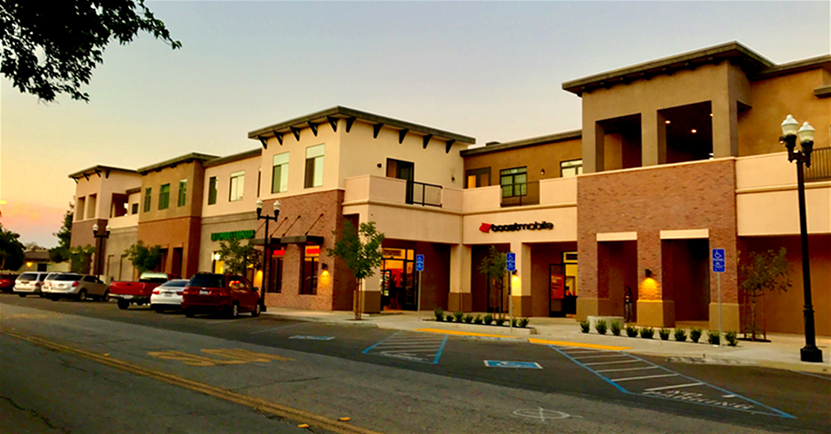Uptown Center – Paso Robles
When he started developing Uptown Center, Ryan Jeffrey hadn’t set out to solve the problem of limited access to healthy food in North…
Read MoreFinancing Partners:
|
Capital Impact Partners, Northern California Community Loan Fund, Rural Communities Assistance Corporation, Morgan Stanley |
Financing:
|
$5.9 million in NMTCs, $4 million NMTC Leverage Loan, $331,240 Working Capital |
When he started developing Uptown Center, Ryan Jeffrey hadn’t set out to solve the problem of limited access to healthy food in North Paso Robles. A private developer, Jeffrey, had cleaned up a family-owned property that was a brownfield site and was looking to develop the former used car lot into an office park with some retail or maybe senior housing. Working closely with the city and speaking with community leaders, Jeffrey learned of the need to bring commercial services to the rapidly growing, low-income, predominantly Latino neighborhood.
“There’s a lot of housing coming in,” including 300 low-income units “but no commercial services for all the people here – nowhere to even buy groceries,” he notes. “Lots of people in this neighborhood don’t have a car, so people are taking the bus four miles across town just to get groceries or do laundry.” In response to the community and city, Jeffrey shifted Uptown Center to be a mixed-use affordable housing and retail development that will be anchored by a small Latino grocery store selling produce and fresh meats, a bakery and fresh tortilleria, and other needed services to the neighborhood. “We’re not a non profit business, like many who take on these projects,” Jeffrey offers, “but that doesn’t mean we can’t do something that is beneficial”
Even with strong city and community support, identifying the right financing for the project was challenging. Turned down by traditional lenders for years, Jeffrey finally found support for Uptown Center through California FreshWorks. Given the high vacancy rate of commercial properties, the low-income designation, and high unemployment rates of the area, the project was seen as too risky for traditional banks to finance. “It was a challenge to get numbers to pencil,” shares Ryan, “Land is getting more expensive and construction costs keep going up.” FreshWorks was able to fill the gaps by leveraging multiple lenders and investors using New Markets Tax Credits (NMTC). Capital Impact Partners worked with Morgan Stanley to provide $5.9M of tax credit equity investment. A key new addition to the FreshWorks team, the Rural Community Assistance Corporation (RCAC), joined NCCLF as a partner on a $4M leverage loan that was required for the larger NMTC investment. Jeffrey admits, “Without the facilitation of FreshWorks, I’m not sure I could have made this project happen.”
As lenders, the FreshWorks team also supported Jeffrey to help ensure the viability of the project. RCAC brought important expertise in rural community and economic development. “The project was a good fit for our mission and goal of creating jobs in underserved rural communities,” said Mike Carnes, the Loan Officer for the project. “We did have some concerns about the high commercial rental rates and the need to account for vacancies in the underwriting process,” Carnes continued, noting the importance of keeping rents affordable enough to ensure businesses can fill all the spaces and thrive in the long run. “We’re certainly happy to be involved in a project that provides jobs and better access to food and other services in an underserved area.” states Carnes. However, he sees the grocery store not just as a community benefit, but as a key to the viability of the project, adding “The grocery store is a major anchor to the site and it will draw people to the other businesses.”
Building trust was key for Jeffrey in securing strong tenants to fill the 6,800 sq ft grocery space and other smaller commercial spaces. “You’ve gotta immerse yourself and get to know the right people on the ground.” He cultivated relationships with business owners and brokers through the Hispanic Chamber of Commerce to find small local business owners who could successfully serve the majority Latino population. “It’s a big risk for these small businesses, they have to invest a lot into the space, sometimes $200 – $250k, they need to be sure they can trust me.” After the original grocery tenant pulled out, Jeffrey personally took the initiative to reach out to dozens of stores in a 60 mile radius to find a Latino store that was successfully selling quality fresh produce, fresh meats, and a full range of grocery staples. He followed leads, cold called, and visited stores to ensure the food sold was fresh and good quality. Eventually he found the owner of Carniceria La Barata, who operates two successful stores in Greenfield and King City. “I really like that he’s young and creative” Jeffrey says of the store operator. “He’s got a plan to sell meat and produce wholesale to restaurants in the area” to make sure the market is economically viable. An additional benefit is the owner of the grocery store and other store owners will also live at Uptown Center. “It creates a real community feeling, like I’ve only really seen in other countries, when your neighbor is the one selling you groceries or bread.”
Jeffrey is now a strong advocate for mixed use development that is both beneficial for the community and a secure investment for the developer. He hopes that Uptown Center and the groceries, fresh breads, and tortillas it provides will help catalyze more development in the neighborhood to provide better housing and more services to local residents. In the immediate future, Jeffrey imagines the grocery store will positively impact the hundreds of children from the local elementary school who usually shop for unhealthy snacks at local liquor stores. Jeffrey states, “Lifelong habits start young. Kids deserve to have healthy choices – it can change the course of someone’s life.”
